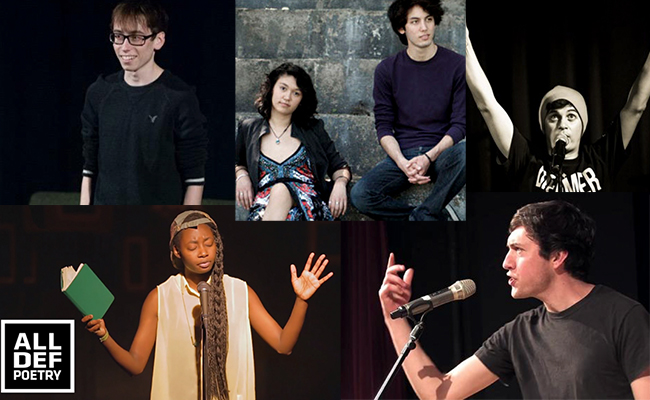Five Pieces of Poetry Science Fiction Fans Will Love
Posted by
Alyssa Favreau
That first song? Pure poetry, we tells ya.
We’re used to poems that explore romance, mythology, deep emotion, but sometimes these same poems incorporate a more science fictional component. And why not? Why shouldn’t astronauts, aliens, and killer clones get their share of the lyrical limelight?
Monstrous creations grown in secret dank labs need an outlet, and the poems inspired by our inevitable apocalypse will likely be full of beautiful pathos (one hopes that someone will be around to read them). Here are some poems that merge science and art, and do so wonderfully.
1. “The Migration of Darkness,” Peter Payack
Each evening, shortly after sunset,
darkness covers the land.
Having mystified thinkers for millennia,
the mechanism for this occurrence
has now been identified: migration.
Darkness, it has been found, is composed
of an almost infinite number of particles,
which roost and reproduce up north
where they have fewer natural enemies:
Forest fires, lampposts, lasers, blazing sunlight,
torches, candles, lighthouses, limelight, and electricity
are relatively rare in the polar regions.
Payack’s poem, written in a documentary style, posits that darkness is an organism, and an active one at that. Despite the head-tilting premise, there’s something so beautiful about the idea that our world is alive, and that even the most commonplace occurrences—like nightfall—happen purposefully. What would happen if the darkness decided not to migrate? It’s a good poem that stays with you long after you’ve read it.
2. “Goblin Market,” Christina Rossetti
Evening by evening
Among the brookside rushes,
Laura bow’d her head to hear,
Lizzie veil’d her blushes:
Crouching close together
In the cooling weather,
With clasping arms and cautioning lips,
With tingling cheeks and finger tips.
“Lie close,” Laura said,
Pricking up her golden head:
“We must not look at goblin men,
We must not buy their fruits:
Who knows upon what soil they fed
Their hungry thirsty roots?”
“Come buy,” call the goblins
Hobbling down the glen.
Sure the Goblin Men represent carnal sin, but sometimes it’s fun to take things at face value. In this case Rossetti’s cautionary tale—intended as a warning for young maidens tempted to relinquish their virtue—turns into a fierce battle between a pair of siblings and some truly terrifying, animal-human hybrid monsters. Lizzie gets infected by the Goblin Men (zombie plague anyone?) and it’s up to her sister Laura to save her from a horrible, brain-craving fate.
3. “Space Oddity,” David Bowie
This is ground control to major Tom, you've really made the grade
And the papers want to know whose shirts you wear
Now it's time to leave the capsule if you dare
This is major Tom to ground control, I'm stepping through the door
And I'm floating in a most peculiar way
And the stars look very different today
Here am I sitting in a tin can far above the world
Planet Earth is blue and there's nothing I can do
Pop songs count as poetry, okay? Or at least Bowie’s beautiful ode to a space travel tragedy does. Bringing new meaning to the phrase “Houston, we have a problem,” Major Tom has very little time left after his ship fails. It’s how he deals with his impending demise that is truly heart wrenching, and if science fiction doesn’t make us wonder how we’d react in extreme situations—thereby shedding some light on our own humanity—the genre isn’t doing its job.
4. The Quiet World, Jeffrey McDaniel
In an effort to get people to look
into each other’s eyes more,
and also to appease the mutes,
the government has decided
to allot each person exactly one hundred
and sixty-seven words, per day.
When the phone rings, I put it to my ear
without saying hello. In the restaurant
I point at chicken noodle soup.
I am adjusting well to the new way.
Late at night, I call my long distance lover,
proudly say I only used fifty-nine today.
I saved the rest for you.
When she doesn’t respond,
I know she’s used up all her words,
so I slowly whisper I love you
thirty-two and a third times.
After that, we just sit on the line
and listen to each other breathe.
There’s something very current about McDaniel’s 1998 poem. Perhaps it’s our bite-sized, Twitterified modern communication, or the recent popularity of films like Her, but the idea of a government stepping in to make human relationships more meaningful seems tailor made for a young adult novel. (Picture it: The clumsy brunette protagonist teams up with the moody and mysterious boy to fight for their right to have four-hour phone conversations that rack up their parents’ phone bills).
5. “Aniara,” Harry Martinson
We're slowly coming to suspect that the space
we're traveling in is of a different sort
from what we thought whenever that word "space"
was decked out by our fantasies on Earth.
We're coming to suspect now that our drift
is even deeper then we first believed,
that knowledge is a blue naiveté
which with a measured quantity of insight
imagined that the Mystery has structure.
We now suspect that what we claim is space
and glassy clarity around Aniara’s hull
is spirit, everlasting and impalpable,
that we have strayed in spiritual seas.
I kind of love that two decades before winning the Nobel Prize for literature—“for writings that catch the dewdrop and reflect the cosmos”—Martinson was writing epic poems chronicling the tribulations of Mars colonists. Clocking in at a whopping 103 cantos, “Aniara” follows closely the fortunes of the eight thousand colonists aboard the ship, as well as their computer, the Mima. Unlike some of the more threatening computers in science fiction, Mima cares deeply about humanity, even dying of grief when faced with the destruction of Earth.
Honorable mention goes to Freddie Mercury’s “Princes of the Universe,” if only because I love the idea of Mercury as an intergalactic warrior (and 80s anthems are my jam), and “Attack of the Crab Monsters,’ by Lawrence Rabb, because of that title.




